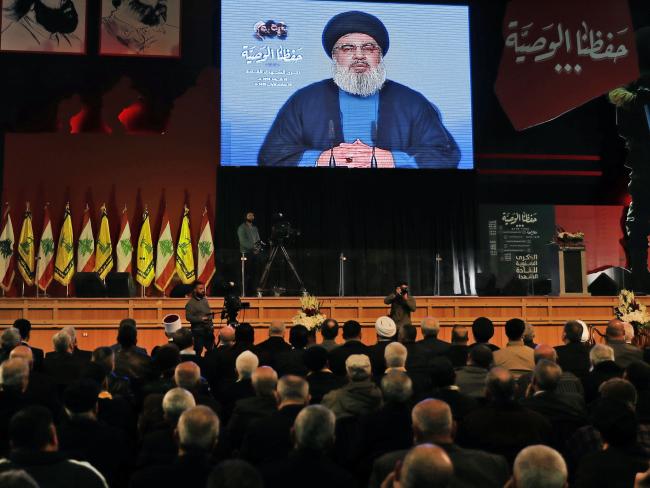IN THE MEDIA
It’s time Australia recognised Hezbollah in its entirety as a terrorist organisation
March 1, 2018 | Colin Rubenstein

The Daily Telegraph – March 1, 2018
THERE is a group that was described by a senior US security official 15 years ago as the “A-Team of terrorists” and has only gone from strength to strength in the years since then. This group perpetrates violent acts against civilians, calls for mass murder and, by its own admission, doesn’t differentiate between its political and military arms.
Yet Australians are effectively free to fly this group’s flag, fill its coffers and offer it material support, even as its operatives undertake terrorist activities in our region.
The group is Hezbollah, a Shi’ite political party and militant group based in Lebanon, armed, financed, trained and commanded by Iran. At the moment, only the group’s military apparatus is listed by Australia as a terrorist organisation.
But recent international debates on Hezbollah remind us why Australia needs to reassess this listing and add the entirety of Hezbollah to our banned list.
In January this year, a political debate in the British Parliament on the proscription of Hezbollah turned out to be a rare display of political consensus.
That debate correctly noted that Hezbollah as a whole is officially listed as a terrorist organisation by the US, Canada, the Arab League, the Netherlands and the (Persian) Gulf Co-operation Council.
UK Labour MP Joan Ryan stressed that Hezbollah calls for the obliteration of Israel, threatens its population with hundreds of thousands of rockets and spreads antisemitic slurs.
Her UK Conservative colleague Theresa Villiers added: “Hezbollah is a violent, genocidal terrorist organisation dedicated to the destruction of the state of Israel.”
Scottish National Party MP Stuart C. McDonald referred to Hezbollah’s bloody contribution to international terror since its inception, which has resulted in the deaths of thousands of Muslims, Christians and Jews.
David Jones (Conservatives) and Jim Shannon (Democratic Unionist Party) singled out Hezbollah’s military support of the dictator Bashar al-Assad in Syria, as well as the deployment of its militiamen to Iraq. He further noted the Hezbollah operatives who assist anti-Western forces in Afghanistan, the Houthis in Yemen and Hamas in Gaza. One fact clearly stood out from the parliamentary debate, a fact that makes a mockery of Australia’s treatment of the group, the division of Hezbollah into political and terrorist “wings” is entirely artificial, no more than a polite fiction.
Ryan pointed out that Hezbollah itself “makes no distinction between its political and military wings, and nor should the British government”.
Cracking down on Hezbollah’s financial pipelines can assist in the fight against international crime, because Hezbollah generates money for its activities from drugs and money laundering operations in several continents, trafficking narcotics from South America into Europe and the US.
She quoted Naim Qassim, the organisation’s deputy general secretary, who said in 2012: “We don’t have a military wing and a political one … every element of Hezbollah, from commanders to members as well as our various capabilities, are in the service of the resistance.”
A few weeks later a cross-party group of 60 members of the European Parliament released a public letter demanding that Hezbollah in its entirety be banned by the EU.
Meanwhile, the US administration has recently stepped up its global efforts to curb the “dirty’ money channels used by Hezbollah to finance its violent activities, launching a whole new series of sanctions on individuals and companies associated with the group on February 2.
It is time for Australia to move to designate Hezbollah as a whole, not just segments of it, as a terrorist organisation under Australian law.
Such a move would further empower law enforcement agencies to prosecute Hezbollah’s supporters, as well as seize and monitor funds consigned to Hezbollah.
Cracking down on Hezbollah’s financial pipelines can assist in the fight against international crime, because Hezbollah generates money for its activities from drugs and money laundering operations in several continents, trafficking narcotics from South America into Europe and the US.
Clamping down on Hezbollah would also have regional advantages. Reports say that, as well as in Australia, Hezbollah operatives have been active in Thailand, the Philippines, Singapore, Malaysia, and Myanmar in the past two decades.
In Australia, there have been reports of police investigating alleged Hezbollah cells.
The principal argument given for maintaining the fiction of Hezbollah having terrorist and political wings makes no sense, as numerous participants in the British parliamentary debate pointed out.
Those in favour of keeping the distinction argue that banning Hezbollah entirely would cut off lines of communication to the Lebanese government.
Yet countries which have banned all of Hezbollah, including Canada, the US and the Netherlands, have no problem communicating and interacting with the government in Beirut. Indeed, despite the ban, the US continues to provide the Lebanese people with substantial aid.
Hezbollah has no “wings”, as the group’s own leaders happily concede. Splitting the group, as Australia currently does, simply gives it the means to evade law enforcement and financial sanctions. This does nothing to enhance global or regional security.
Dr Colin Rubenstein is executive director of the Australia/Israel & Jewish Affairs Council. Previously, he taught Middle East politics at Monash University for many years.
Tags: Australasia, Australia, Hezbollah, Malaysia





